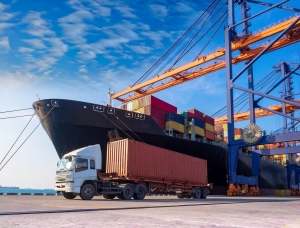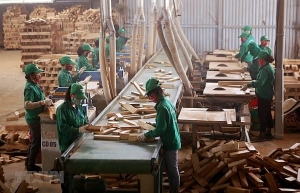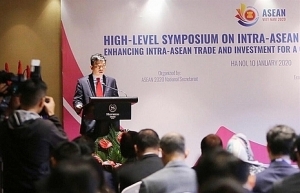ACTS eyes expansion to benefit from regional trade flows
 |
| Paul Mandl, team leader of the ARISE Plus Programme (left) and Igor Driesmans, EU Ambassador to ASEAN |
It has been only a few months since the launch of the ACTS. How important is the ACTS in terms of regional trade flows and socio-cultural cooperation, and what other benefits will it provide?
Igor Driesmans: The ACTS is a vital building block of ASEAN economic integration. It acts as a catalyst for the development of seamless and efficient transport flows among ASEAN member states, facilitating regional trade in goods through standardised and harmonised customs procedures. Thanks to its sophisticated and powerful IT system, the ACTS can track regional transit cargo movements from departure to destination. In addition, the digital network enables pre-arrival processing by customs at borders and destination, providing for advanced risk management for the protection of society.
Major advantages are in place for reliable traders, permitting door-to-door loading and delivery of regional cargo operations. The ACTS brings all the stakeholders in the public and private sector of ASEAN closer together, promoting regional cooperation in handling goods under customs transit. These stakeholders include ASEAN customs authorities and government transport agencies along with freight forwarders, logistics, and transport providers along with importers, exporters, and manufacturers.
Paul Mandl: These are early days for the ACTS, and so far ASEAN member States have not run many ACTS movements. This is partly due to the advent of the COVID-19 pandemic, and some refinement of national regulations. Therefore, we will be in a better position to respond to this question once more ACTS transactions have taken place.
How was trade cooperation developing in ASEAN in 2020 amid COVID-19? How can the ACTS accelerate ASEAN integration and boost its growth and competitiveness as an economic bloc in the new normal?
Igor Driesmans: In 2020 the EU and ASEAN upgraded their relations to a strategic partnership, which is a strong political message on the willingness of both sides to deepen and widen our partnership. Trade and economic relations are an important cornerstone of this partnership.
Examples of cooperation are many. Following the outbreak of the COVID-19 pandemic, the EU announced €800 million of Team Europe support to Southeast Asia, followed by a further €20 million in December 2020, on top of substantial contributions to the COVAX facility, which will provide fair and equitable access to COVID-19 vaccines to ASEAN countries and worldwide.
We also look into the post-pandemic future – there are many complementarities between the ASEAN Comprehensive Recovery Framework and our Recovery Plan for Europe, which aim to “build back better and greener” by prioritising sustainability and paying due attention to digitalisation. These are areas that offer ample opportunities for further business cooperation, trade, and investment opportunities.
We also believe in the great potential of connectivity, as confirmed by the Joint Statement on Connectivity, which was adopted during our Ministerial Meeting in December 2020. In the near future, we aim to finalise negotiations of the Comprehensive Air Transportation Agreement (CATA), which could provide an additional boost to our airlines’ post-COVID recovery but will continue to cooperate in all other areas, including on energy, transport, people-to-people and digital issues, with the view of exploring a possible connectivity partnership in the future.
Paul Mandl: The ACTS is a vital building block of ASEAN economic integration. It acts as a catalyst for the development of seamless and efficient transport flows between ASEAN member states, facilitating regional trade in goods through standardised and harmonised customs procedures, in conjunction with a sophisticated and powerful IT system. This system tracks regional transit cargo movements from departure to destination. In addition, the digital network enables pre-arrival processing by customs at borders and destination, providing for advanced risk management for the protection of society.
Major advantages are in place for reliable traders, permitting door-to-door loading and delivery of regional cargo operations. The ACTS brings all the stakeholders in the public and private sector of ASEAN closer together, promoting regional cooperation in handling goods under customs transit. These stakeholders include ASEAN Customs Authorities and Government Transport agencies along with freight forwarders, logistics and transport providers, importers, exporters, and manufacturers.
The ACTS offers a special facilitated regime for monitoring goods required for disaster relief, including vaccines. These goods can be entered into the ACTS without the need for an accompanying guarantee as the goods are exempt from customs duties and taxes, and the operation will be overseen by ASEAN governments or their approved agencies.
How can the ACTS boost future business potential? What are the broad benefits that an efficient road logistics network can bring to the region?
Igor Driesmans: Currently, the ACTS handles the movement of goods only by road, but it has the potential to cater for multimodal movements by all modes of transport. Analysis of possible upgrading is currently in progress to include the movement of dangerous goods and products covering sanitary and phyto-sanitary (SPS) regulations. This will further enhance the future business potential in ASEAN, as demand is high for their inclusion under the ACTS regime.
The ACTS is today in use in six ASEAN member states: Cambodia, Lao PDR, Malaysia, Singapore, Thailand, and Vietnam, and will hopefully be expanded to the remaining four ASEAN Member States when the conditions will allow – the most significant being the implementation of roll-on roll-off ferry services (that is, for Indonesia and the Philippines).
Paul Mandl: The ACTS boosts business potential by reducing the costs of doing business in ASEAN. A recent survey indicates that the cost of a regional transit movement of goods by road can be reduced by 27 per cent if the ACTS is used. The faster, more efficient regional movement of trucks under the ACTS provides a platform for greater efficiency in the use of trucking fleets which helps to reduce carbon footprints. This also provides an incentive for more goods to be traded within ASEAN in this way.
In particular, the ACTS is able to facilitate the movement of exports via Vietnam to adjoining countries, Lao PDR, Cambodia, and Thailand, and elsewhere in ASEAN. The ACTS offers similar facilitation for imports from elsewhere in ASEAN via Vietnam to the ASEAN market.
An efficient road logistics network brings benefits of all kinds, in particular, economic benefits that improve the living standards of all concerned. This is because intraregional trade is an engine of economic growth. Faster, more efficient road transit movements under the ACTS will offer such benefits.
Roads are the arteries through which the economy pulses. By linking producers to markets, workers to jobs, students to school, and the sick to hospitals, roads are vital to any development agenda.
What is the role of the EU in the development and implementation of the ACTS? What are prospects can you foresee for trade between ASEAN and the EU?
Igor Driesmans: The EU has supported ASEAN in the development and implementation of the ACTS through the Arise Plus programme with an investment of €10 million. In addition to the €5 million invested by ASEAN, this constitutes one of the biggest financial contributions towards the practical establishment of the ASEAN Economic Community.
We have provided the technical expertise required for the development of the ACTS. This is based on the successful automation of transit movements in Europe, under the New Computerised Transit System (NCTS). EU experts have worked alongside ASEAN experts for many years to develop and maintain the system. For example, one of our experts is currently working with Vietnam customs to prepare for the latest release of the ACTS software as well as providing training to customs bodies and the private sector on how to use the system. We also have provided additional EU funding for the ACTS Central Management Team (CMT) based in the ASEAN Secretariat in Jakarta, Indonesia, consisting of experts from the ASEAN region. The CMT has the responsibility to manage the day-to-day operations of ACTS, to ensure the long-term sustainability of the ACTS in ASEAN.
The EU is the third-largest trading partner of ASEAN, as well as one of the largest investors in the region. We share a similar outlook on open markets, on the importance of the rules-based multilateral order, and on the value of regional cooperation. We should build on this shared outlook an even closer cooperation.
We share a common interest in green and digital transformation. These are also at the heart of the EU’s new trade policy and offer opportunities for more business cooperation and regulatory dialogues.
Given the intensity of our trade relationship, it is not surprising that ASEAN is the region with whom the EU has engaged in a number of FTA negotiations. Two were successfully completed and are being implemented: namely with Singapore and Vietnam. Negotiations are ongoing with Indonesia. Those and other possible future bilateral FTAs could serve as building blocks towards deeper region-to-region relations. To bring us closer to this goal, significant work has been done by the EU-ASEAN Joint Working Group in preparing the grounds for further region-to-region engagement. This work shows that while there are many important areas of commonality, there are also notable gaps, especially in areas that are of crucial importance to the EU, such as trade and sustainable development, public procurement and intellectual property rights. The EU is ready to engage further to make progress in these areas.
 | ASEAN Customs Transit System launched to boost regional trade Cross-border traders in ASEAN can now take advantage of a newly-launched online customs transit management system – the ASEAN Customs Transit System (ACTS) to accelerate ... |
 | EVFTA to have wide impacts on transport businesses The EU-Vietnam Free Trade Agreement is having an impact on the local government procurement market, with transport being among the more attractive sectors to EU ... |
 | First protocol amending ASEAN Trade in Goods Agreement approved The Government has issued a resolution approving the first protocol that amends the ASEAN Trade in Goods Agreement (ATIGA). |
 | Intra-ASEAN trade flourishing following mutual commitments Nearly five years have elapsed since the ASEAN Economic Community was established, and businesses in the region have gradually taken advantage of the bloc’s import ... |
 | Promoting intra-ASEAN economy for a cohesive and proactive bloc Enhancing intra-ASEAN trade and investment is important for a cohesive and responsive ASEAN. |
What the stars mean:
★ Poor ★ ★ Promising ★★★ Good ★★★★ Very good ★★★★★ Exceptional
Related Contents
Latest News
More News
- State corporations poised to drive 2026 growth (February 03, 2026 | 13:58)
- Why high-tech talent will define Vietnam’s growth (February 02, 2026 | 10:47)
- FMCG resilience amid varying storms (February 02, 2026 | 10:00)
- Customs reforms strengthen business confidence, support trade growth (February 01, 2026 | 08:20)
- Vietnam and US to launch sixth trade negotiation round (January 30, 2026 | 15:19)
- Digital publishing emerges as key growth driver in Vietnam (January 30, 2026 | 10:59)
- EVN signs key contract for Tri An hydropower expansion (January 30, 2026 | 10:57)
- Vietnam to lead trade growth in ASEAN (January 29, 2026 | 15:08)
- Carlsberg Vietnam delivers Lunar New Year support in central region (January 28, 2026 | 17:19)
- TikTok penalised $35,000 in Vietnam for consumer protection violations (January 28, 2026 | 17:15)

 Tag:
Tag:

























 Mobile Version
Mobile Version